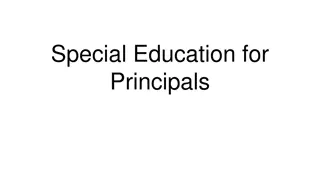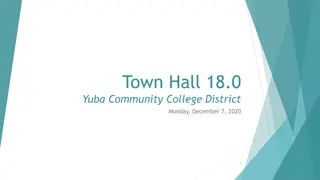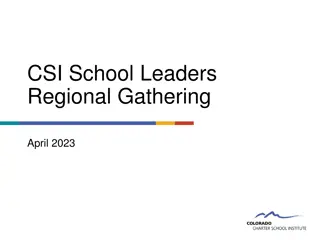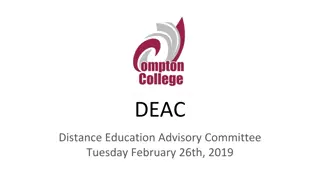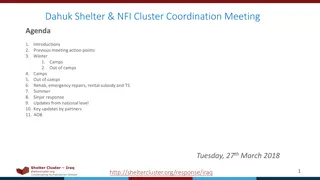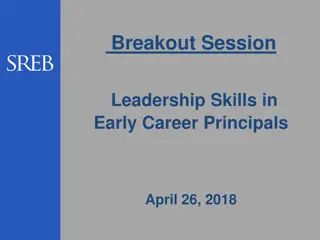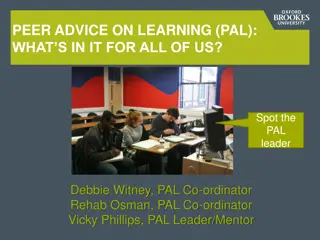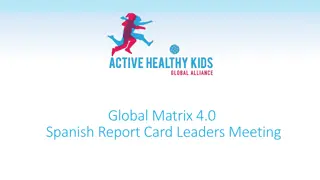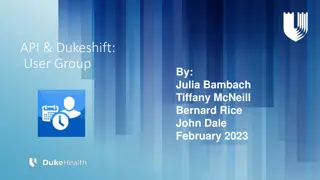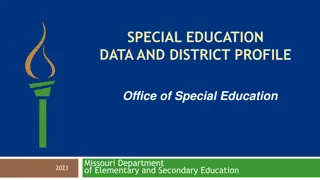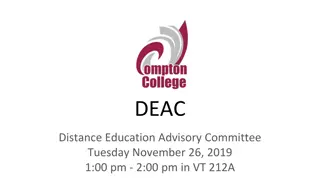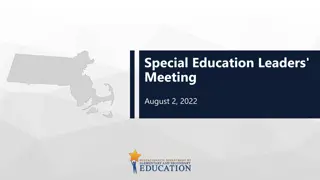Special Education Leaders Meeting Highlights and Updates
Special Education Leaders Meeting on September 10, 2021, discussed future topics, feedback on recent survey, and strategies for engaging special education administrators. Key points included utilizing shared screens/spaces for increased viewing capacity and important COVID-related links provided by the Massachusetts Department of Elementary and Secondary Education. Details on remote learning implementation and individual student accommodations were also addressed.
Download Presentation

Please find below an Image/Link to download the presentation.
The content on the website is provided AS IS for your information and personal use only. It may not be sold, licensed, or shared on other websites without obtaining consent from the author.If you encounter any issues during the download, it is possible that the publisher has removed the file from their server.
You are allowed to download the files provided on this website for personal or commercial use, subject to the condition that they are used lawfully. All files are the property of their respective owners.
The content on the website is provided AS IS for your information and personal use only. It may not be sold, licensed, or shared on other websites without obtaining consent from the author.
E N D
Presentation Transcript
Special Education Leaders' Meeting September 10, 2021
01 Welcome and Ignite Recall 02 CONTENTS 03 Chunk and Chew New Information 04 Q&A 04
01 Welcome and Ignite
Future Special Education Leaders Meetings Meetings will be topic based. Other information will be shared through Special Education Updates Thank you for your feedback on our recent survey Target audience will be special education administrators Consider creative solutions such as using a shared a screen/shared space and/or viewing of the recordings to increase capacity of viewing for your school/district Massachusetts Department of Elementary and Secondary Education
02 Recall
Chunk and Chew New Information 03
Important COVID-related links on DESE website Special Education: https://www.doe.mass.edu/covid19/sped.html o DESE letter to parents o FAQ o Webinar recordings On the Desktop: https://www.doe.mass.edu/covid19/on-desktop.html o Protocols for Responding to COVID-19 Scenarios o Protocols Flowcharts FAQs: https://www.doe.mass.edu/covid19/faq/ o Protocols and other reopening FAQs (also sent out in the Commissioner s Weekly Update) COVID-19 Testing Program: https://www.doe.mass.edu/covid19/testing/ o Authorized School Application o COVID-19 Testing and eMed FAQs 7 Massachusetts Department of Elementary and Secondary Education
Remote learning Under what circumstances may remote learning be implemented? o As described in DESE's August 20, 2021 FAQ, during the 2021-22 school year, full-time remote learning programs will not count toward structured learning time hours unless specifically previously authorized by DESE. o Only in the limited instance where students are isolating and/or quarantining, if schools have the ability to allow students to join their schedule remotely, then they may do so. Consistent with DESE s guidance on student attendance, quarantining students who participate in at least half of the school day activities can be marked present. Massachusetts Department of Elementary and Secondary Education
Individual Student Accommodations 603 CMR 28.03 (3)(c) and 28.04 (4) Individual Student IEP Contingency (Unscheduled evaluations for medical reasons) 603 CMR 28.04(4) Students with an IEP who are likely unable to attend school in person for more than sixty (60) school days in any school year, as documented by a physician. More information may be found in the Q&A guide. Individual Student Medical Requirement Home or Hospital Services 603 CMR 28.03(3)(c) Students unable to attend school in person for a minimum of 14 days. More information about this regulation may be found in the Q&A guide. Under these circumstances, districts may need to provide services, which may include live streaming and/or remote learning. These accommodations apply only to individual students with documented medical needs. School districts should work with families individually to accommodate the rare cases in which a sibling or family member is immunocompromised and additional precautions are required from the whole family. Remote or virtual learning may be an option for students in these families at a district s discretion. 9 Massachusetts Department of Elementary and Secondary Education
FY22: Districts may purchase courses from Commonwealth of Massachusetts Virtual Schools (CMVS) for students with a documented medical need Students Who Cannot Attend School in Person Due to a Documented Medical Need (Home/Hospital) The Department is making an additional option available for districts to supplement current services for students who cannot attend school in person due to a documented medical need. Districts may purchase individual courses or a bundle of grade-level courses from one or both of the Commonwealth of Massachusetts Virtual Schools (CMVS) on a limited basis. Students accessing these virtual courses would need to remain enrolled in the district, continue to take courses remotely in their current district, and continue to receive services from the district. More information forthcoming. 10 Massachusetts Department of Elementary and Secondary Education
Guidance on Time-Out Rooms
Reducing or Eliminating the Use of Time-Out Rooms Make concerted efforts to reduce or eliminate the use of time-out rooms Goal: increase amount of time students learn with peers Advisory separated into 4 sections: I. Promoting social emotional wellbeing of students II. Adopting alternatives to reduce or eliminate the use of time-out rooms III. Important safeguards if using time-out rooms Rooms must be clean, safe, sanitary, and appropriate for the purposes of calming students IV. State and federal resources 12 Massachusetts Department of Elementary and Secondary Education
I. Proactively Implement Strategies, Interventions, and Supports That Promote Social Emotional Wellbeing of Students Proactively implement school-wide, evidence-based system that focus on the whole student, including each student s social emotional wellbeing Establish predictable school and classroom routines and expectations Safe and supportive relationships are key to fostering a strong sense of community and belonging Promoting Student Engagement, Learning, Wellbeing and Safety (Summer 2021): https://www.doe.mass.edu/covid19/mental-health.html 13 Massachusetts Department of Elementary and Secondary Education
Supporting Individual Students IEP Teams must consider the use of positive behavioral interventions and supports, and other strategies in cases where the student s behavior interferes with their learning or the learning of others. See 34 C.F.R. 300.324(a)(2). Critically important to hear from parents, guardians, or other caregivers about the student s experiences and strategies that may be helpful. Collect, examine, and analyze data to help inform decisions as to interventions, supports, and strategies. If repeat behavioral incidents, consider new or different services, supports, etc. If a student does not have an IEP, repeat behavioral incidents may indicate a student needs to be evaluated for eligibility for special education. 14 Massachusetts Department of Elementary and Secondary Education
II. Adopting Alternatives to Reduce or Eliminate the Use of Time-Out Rooms Consider ways to reduce or eliminate use of time-out rooms Consider alternatives to increase amount of time students learn with their peers Gain valuable academic and social emotional skills Increase sense of connection to peers and the school community Overuse or inappropriate use of time-out rooms can result in academic loss and trauma Collaborate with the school community and families Co-regulation of student and staff Provide opportunities for staff to learn more about self-regulation and co-regulation Provide consistent support and supervision Federal, state, and/or local funds may be used 15 Massachusetts Department of Elementary and Secondary Education
III. Important Requirements if Using Time-Out Rooms Must follow relevant sections of 603 CMR 46.00 (Prevention of Physical Restraints and Requirements, if Used) Approved Special Education Schools must also follow 603 CMR 18.05 (Program and Safety Standards for Approved Public or Private Day and Residential Special Education School Programs) Staff shall be with the student or immediately available to the student at all time. The space must be: Clean Safe Sanitary Appropriate for the purposes of calming o 16 Massachusetts Department of Elementary and Secondary Education
III. Important Requirements if Using Time-Out Rooms Student must be continuously observed by a staff member. Time-out shall cease as soon as the student has calmed. Must obtain principal s approval if time-out lasting more than 30 minutes. 17 Massachusetts Department of Elementary and Secondary Education
Some Key Recommendations Designate someone to regularly check for cleanliness, etc. o Comfortable place to sit o Sensory tools, as appropriate, for calming Communicate with parents or guardians about use o Increases transparency, family engagement, and collaborative problem solving o Notification to parents or guardians if used Verbal notification: before student returns home or at the latest within 24 hours of use, or as agreed upon with the parents or guardians Written notification: within three school-working days, or as agreed upon with the parents or guardians Staff helping student calm has positive relationship with student De-brief with student and staff 18 Massachusetts Department of Elementary and Secondary Education
Some Key Recommendations Collect, review, and analyze data regarding use See Forthcoming Time-Out Log for suggested elements Will be posted here: Technical Assistance - Documents - Special Education (mass.edu) Special education schools: see existing documentation requirements in 603 CMR 18.05(5)(i) Principal should review and analyze time-out data on a weekly basis to identify any trends that need to be addressed Principal should conduct monthly analysis of school-wide data and discuss next steps for any needed changes 19 Massachusetts Department of Elementary and Secondary Education
1) To be reviewed with Superintendents and Principals. Please share and discuss with all educators in your school. 2) Request for Information (RFI). DESE will collect list of behavioral intervention programs. Next Steps 3) Possible grant opportunity. Identify public school districts, collaboratives and approved special education schools to pilot implementation of alternatives. 4) Continuing focus on this topic. Continued engagement and collaboration with stakeholders to improve students experiences.
Upcoming Special Education Leaders Only Zoom Meetings Topic Specific Meetings: IDEA Equitable Services and New DESE Guidance Date/Time of Meeting s Friday, September 10, 2021 11:00-12:00 Friday, September 24, 2021 12:30-1:30 21 Massachusetts Department of Elementary and Secondary Education
04 Q&A







